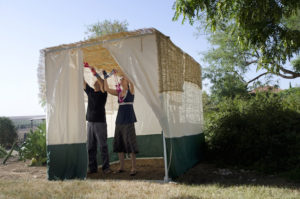“You are to live in sukkot for seven days; every citizen of Israel is to live in a sukkah, so that generation after generation of you will know that I made the people of Israel live in sukkot when I brought them out of the land of Egypt; I am Adonai your God.’”-Leviticus 23:42-43
One of the more interesting commands God gives to his people concerning the observance of SUKKOT is that they are to live in “booths” or “huts” during the full 7-day period of the feast.
And what is the Hebrew word for “booths” or “huts”?
It is SUKKOT.
SUKKOT are basically open-air shelters that can be constructed in any number of ways only limited by one’s imagination.
Here’s an inspiring quote explaining the reason why God gave this command:
“The symbolism associated with the Sukkah is one that is intended to remind us of being homeless, the feeling of living somewhere on a temporary basis. It should serve as a reminder to us not to become over confident with our wealth or influence. It should remind us that we need to look to God for our provisions, not man. It should also remind us that this earth is not our permanent home. It is also symbolic of the protection that the Jews [Hebrews] received from God in the desert after they were freed from bondage in Egypt (Lev. 23:43). It should remind us that our survival is dependent upon God.“-Taken from Jewishroots.net
If you visit Israel during the SUKKOT season, you can see a variety different SUKKAH set up all over the place, some very simple and others quite elaborate with flashy decorations hanging from them.
However, nowadays people don’t usually live in the SUKKOT for the full 7-day period of the feast.
The people will eat out of them and maybe for a night or two sleep under the SUKKAH but that’s about the extent of it.
One may ask is this not breaking the commandment to live in the SUKKOT for seven days?
This leads me to a very important point.
The Torah gives us much latitude in terms of HOW to observe the feasts but there is zero latitude concerning the question of whether we should observe them or not.
And the same goes for SHABBAT by the way.
In fact, the TORAH has very little to say concerning exactly how to observe most of God’s ordained observances, especially in light of the fact that all the sacrificial rituals have been removed due to there being no temple.
The important thing to remember is that SUKKOT is symbolic.
When it says to “dwell” or “live” in the SUKKAH, does it literally mean we are to “move into and live there“?
I would think it more means to make it a part of your life for that period, and center your daily activities around it.
Check out these verses from Nehemiah.
“They found written in the Torah that Adonai had ordered through Moshe that the people of Isra’el were to live in sukkot during the feast of the seventh month; and that they were to announce and pass the word in all their cities and in Yerushalayim, “Go out to the mountains, and collect branches of olives, wild olives, myrtles, palms, and other leafy trees to make sukkot, as prescribed.” So the people went out, brought them and made sukkot for themselves, each one on the roof of his house, also in their courtyards, in the courtyards of the house of God, in the open space by the Water Gate and in the open space by the Efrayim Gate. The entire community of those who had returned from the exile made sukkot and lived in the sukkot, for the people of Isra’el had not done this since the days of Yeshua the son of Nun. So there was very great joy.-Nehemiah 8:14-17
We can see that even the citizens in Nehemiah did not necessarily interpret God’s command to mean that they had to move out of their homes in to the SUKKAH.
Also Leviticus 23:42 where it says “every citizen of Israel is to live in a SUKKAH“ is also a sticking point.
For instance, while gentile believers are spiritually grafted into Israel, does that constitute them actually living there?
I think it would be prudent to exercise some common sense concerning this issue.
In other words, instead of stressing out over “doing it right”, why don’t we just focus on DOING IT!
Unless we were present in the desert with Moses who received his instructions directly from YHWH Himself, there is no way we can truly know whether we are “doing it right“.
Build a SUKKAH and then celebrate, enjoy and have fellowship during the 7-day holiday.
Remember SUKKOT is to be enjoyable!
“You are to keep the festival of Sukkot for seven days after you have gathered the produce of your threshing-floor and winepress. Rejoice at your festival – you, your sons and daughters, your male and female slaves, the L’vi’im, and the foreigners, orphans and widows living among you. Seven days you are to keep the festival for ADONAI your God in the place ADONAI your God will choose, because ADONAI your God will bless you in all your crops and in all your work, so you are to be full of joy!-Deuteronomy 16: 13-15




Leave a Reply